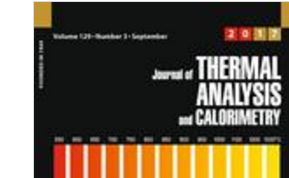M. Brusnikina, O. Silyukov, M. Chislov, T. Volkova, A. Proshin, A. Mazur, P. Tolstoy, I. Terekhova
“Effect of cyclodextrin complexation on solubility of novel anti-Alzheimer 1,2,4-thiadiazole derivative”
J Therm Anal Calorim, 2017
DOI: 10.1007/s10973-017-6252-1
New 1,2,4-thiadiazole derivative displaying neuroprotective potential and high activity in the treatment of Alzheimer’s disease has been synthesized. The objective of this study was to improve the aqueous solubility of this drug-like compound by means of complex formation with native and hydroxypropylated β-cyclodextrins. To this end, aqueous solubility of 1,2,4-thiadiazole derivative was investigated in the presence of β-cyclodextrins. It was shown that the phase solubility diagrams are of Bs type demonstrating the initial increase in thiadiazole solubility in solutions of cyclodextrins (concentration up to 0.01 mol kg−1) followed by a solubility decrease due to the precipitation of the complexes formed. In comparison with β-cyclodextrin, hydroxypropyl-β-cyclodextrin displays more pronounced solubilizing action since it forms more stable complexes with thiadiazole. Solid complexes of 1,2,4-thiadiazole derivative with β-cyclodextrins were prepared by grinding and freeze-drying methods. DSC, TG, hot-stage microscopy, solid-state 13C MAS CP/TOSS NMR, powder X-ray diffractometry and FTIR spectroscopy were used to prove the existence of complexes in the solid state. Solubility of the obtained formulations was also examined. It was found that complexes of thiadiazole with hydroxypropyl-β-cyclodextrin exhibited higher solubility in phosphate buffer (pH 7.4) compared with pure thiadiazole and its complexes with β-cyclodextrin.
